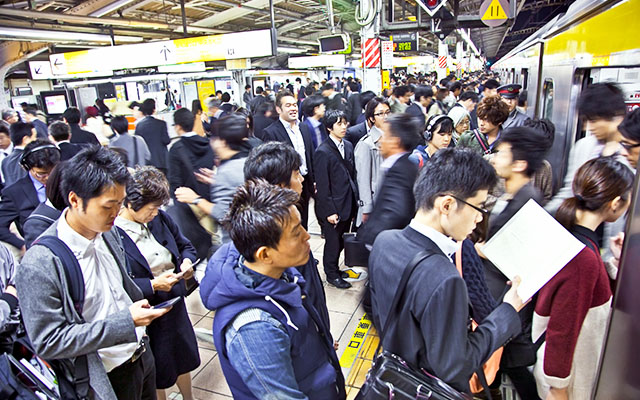- Source:
- Premium Friday
- Tags:
- Japan / Karoshi / Premium Friday / Work
Related Article
-

Airport runway staff in Japan treats departing guests to touching message of gratitude
-

Japan’s Buffest Idol Uses Muscles To Prepare Breakfast In UzaMaid Music Video
-

Brighten Up The Beach While Relaxing On Giant Rainbow Floats
-

Tresspassing And Littering Instagrammers Recreating Studio Ghibli’s Spirited Away Scene Disrupt Local Business
-

Manhattan Roll opens first Kyoto store with limited edition matcha rolled ice cream
-

Japanese Miniature Food Artist Creates Meals Tiny Enough To Be Served On Our Fingertips



In Japan, the term “premium” is often used synonymously with something that is good or highly favored. Take for example Suntory’s “The Premium Malt”, Wendy’s “JAPAN premium” menu, or Panasonic’s “Japan Premium” campaign used to endorse its Made-In-Japan products. In an effort to combat long work hours and karoshi or “death by overwork”, the Japanese government unveiled a new campaign in February called “Premium Friday”, which allow workers to leave by 3:00 pm on the last Friday of every month. Approximately 130 firms, including major companies such as Toyota Motor Corp. and Suntory Holdings Ltd., have already agreed to partake in Premium Friday, and are requesting that all employees halt work by mid-afternoon. Premium Friday was conceptualized from the belief that it will encourage workers to embrace a more balanced work-social life, while simultaneously boosting the economy through increased consumer spending.
Source: Premium Friday
In 2015, one of Japan’s major advertising companies, Dentsu, was rocked by the suicide of 24-year-old Matsuri Takahashi. A promising young graduate of Japan’s prestigious University of Tokyo, Takahashi seemed to have a bright future ahead of her. After undergoing the rigorous job hunting process in Japan known as shushoku katsudou, she was able to land a highly coveted position in the Internet Advertising Department at Dentsu. Over the next six months, Dentsu proceeded to cut more than 50% of the employees in that Department without reducing the workload for its employees. Over the next eight months, it is estimated that Takahashi clocked in over 100 hours of overtime a month until she finally worked herself to death. On Christmas Day in 2015, Takahashi ended her life by throwing herself off of the third story of her company’s dormitory.
Not only was the timing of her death horribly tragic, but the prematurity of her death made it that much more shocking. In the months leading up to her death, Takahashi took her blog to express her feelings. “It’s 4 o’clock. My body is trembling... I just can’t do this. I’m gonna die. I’m so tired,” she writes. Shortly before her death, Takahashi clearly began to exhibit suicidal ideations:
“What will be left of my life even if I manage somehow to overcome this daily stress while thinking of death?”
“Perhaps death is a much happier option.”
Anyone reading her blog could sense the emotional destitution and despair that Takahashi harbored just prior to her death. But what is arguably even more appalling is the public response by some Japanese individuals who seemed to be completely insensitive to the heartbreak surrounding her untimely death. One Japanese university professor and former employee of a finance company tweeted, “Karoshi after just 100 hours of overtime? Pathetic!” His tweet, however, was not well-received and he was publicly chastised. The very fact that the Japanese language has a word for “death by overwork” (karoshi) demonstrates not only the pervasiveness of this issue, but the perverse sense of what work is to many people in Japanese society.
With Premium Friday, the government hopes to avoid similar tragedies from taking place among their young workforce. In an effort to kill two birds with one stone, the government also anticipates that Premium Friday will boost the currently sluggish Japanese economy. What is the logic behind this? More Japanese workers will leave work early to hit up the stores, bars, and restaurants for some shopping and fine wine and dining, thereby increasing consumption and reversing Japan’s current “deflation mindset”. SMBC Nikko Securities Inc. projected an increase in GDP by a maximum of ¥63.5 billion due to the increased consumption. At the same time, however, Premium Friday is expected to reduce work hours, which will essentially oppose the effects of increased consumption.
Given that Premium Friday is still taking its baby steps towards what will hopefully be a permanently ingrained tradition in the Japanese working environment, it is difficult to say whether or not it will be successful. Nonetheless, what can be said is that the government realizes the detrimental effects of workaholism within Japanese society, and the need for immediate reformative change among the Japanese workforce, so that people like Matsuri Takahashi will no longer feel that their company’s work is greater than a human life.